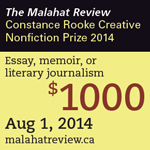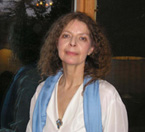2014 Constance Rooke Creative Nonfiction Contest: One Month Left to Enter!
 Deadline: August 1, 2014 Deadline: August 1, 2014
Prize: $1,000 to one winner
Entry fee: $35 for Canadians, $40 for US residents, and $45 outside Canada/US
Additional entries cost $15 from anywhere!
The Malahat Review is pleased to announce its annual call for entries to the 2014 Constance Rooke Creative Nonfiction Prize.
We're on the lookout for all things personal! Spend the next month perfecting your memoir, essay, travel narrative (or any other CNF form) and send it to us by August 1 for your chance at publication and big prize money. Entries must be between 2,000 - 3,000 words and can be sent by email or regular mail.
Full contest guidelines on the Malahat website.
Read an interview with contest judge Priscila Uppal.
Constance Rooke CNF Interview: Catching Up with 2013's Winner, Liz Windhorst Harmer
 Malahat volunteer and past contributor Michael Prior interviewed Liz Windhorst Harmer on life since winning the Constance Rooke Creative Nonfiction Prize back in 2013 for her piece, "Blip." Harmer's submission went on to receive Gold in the Personal Journalism category at the 34th annual National Magazine Awards in June 2014. Malahat volunteer and past contributor Michael Prior interviewed Liz Windhorst Harmer on life since winning the Constance Rooke Creative Nonfiction Prize back in 2013 for her piece, "Blip." Harmer's submission went on to receive Gold in the Personal Journalism category at the 34th annual National Magazine Awards in June 2014.
MP: Only a few months before "Blip" came out, you published a nonfiction piece in The New Quarterly ("Pain: A Brief History of My Intensity") that was awarded runner-up in their Edna Staebler Personal Essay Contest. How have these awards affected your writing life? Do you have any advice for entrants of the Malahat’s upcoming Constance Rooke Creative Nonfiction Prize?
LWH: As far as these things go, 2013 was a year of dreams, when I suddenly was getting happy responses to my work when I had previously met with stony silence. I don't know that winning awards or placing in contests has affected my writing so much as it has given me a necessary breath of confidence. It was amazing to find I'd won and to hear from people who'd read it, and especially to read John Vaillant's comments. That kind of response feels like nothing else—it's something close to feeling that you've really been heard.
Read the rest of Liz's interview on the Malahat website.
Issue 187 Sneak Peek: An Interview with Anne Compton
 Malahat volunteer stephen e. leckie talks with poet Anne Compton about her contribution of three poems to Issue 187, our upcoming Summer 2014 issue. Read on to learn about Compton's take on language, process, and inspiration. Malahat volunteer stephen e. leckie talks with poet Anne Compton about her contribution of three poems to Issue 187, our upcoming Summer 2014 issue. Read on to learn about Compton's take on language, process, and inspiration.
SL: To borrow a question from Tim Bowling: have reviews and awards affected your process, affirmed that your senses are sharp and discerning?
AC: Receiving an award is affirming, a confirmation that someone’s reading your work, but an award in no way changes one’s deeply intuitive writing habits. Oddly enough, though, reviews can alert you to practices in your work that you weren’t aware of. A UK reviewer said “[Compton’s] style is to use quite short sentences combined into long lines. Her technique is to push quite dense material into the short sentences and then pull that through the long lines so that you hang on to the threads of what she is doing” (Manchester Review). I had no idea that my thinking unfolded in that way.
Read the rest of Anne's interview on the Malahat website.
|
|
|
|
|
|